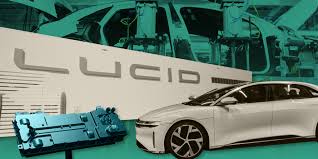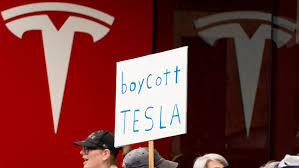Lucid Group: From Tesla Challenger to Struggling Startup – What Went Wrong?
Lucid Group, a luxury electric vehicle (EV) manufacturer, was once seen as a major challenger to Tesla. The company caught the attention of investors and enthusiasts alike with its sleek designs, cutting-edge technology, and impressive range. But despite initial excitement, Lucid’s stock has taken a significant hit, and its future looks uncertain. So, what happened to the promising EV startup?
The Initial Promise: A Tesla Challenger in the Making
When Lucid Motors went public through a SPAC merger in 2021, the excitement was palpable. The company’s flagship vehicle, the Lucid Air, was designed to compete with Tesla’s Model S, offering luxury features, a long driving range, and high performance. With a competitive edge in both technology and design, Lucid quickly became one of the most talked-about EV companies in the market. Investors saw it as a promising player capable of going toe-to-toe with Tesla, and the stock surged.
At its peak, Lucid was viewed as an innovative leader in the EV space, and its stock was often seen as one of the hottest new entries in the electric vehicle race.
The Turning Point: Production Delays and Supply Chain Woes
Despite the initial hype, Lucid’s stock began to slide when the company encountered significant production and delivery problems. While demand for electric vehicles was growing, Lucid struggled to scale its manufacturing operations to meet expectations. The company failed to meet its delivery targets, leaving investors frustrated and questioning the company’s ability to deliver on its promises.
A global semiconductor shortage played a role in these delays, as did issues with supply chains that affected many automakers, including Lucid. However, the company’s inability to efficiently ramp up production and deliver cars to customers was a major red flag. These challenges dampened investor enthusiasm and led to a decline in the stock price.
The Financial Strain: Is Lucid Burning Through Cash Too Quickly?
Lucid’s high cash burn rate has been another significant factor in its stock decline. The company continues to invest heavily in manufacturing, R&D, and marketing, but these investments haven’t yet translated into significant sales or profits. While Lucid has secured large investments, its revenue remains limited, and it has yet to turn a profit.
For a company looking to compete with established giants like Tesla, the inability to generate substantial revenue and maintain a healthy financial position has become a cause for concern. Lucid’s reliance on external funding has only added to the uncertainty surrounding its future.
Competition Heats: Tesla and Traditional Automakers Step Up Their Game
As the EV market continues to grow, Lucid now faces fiercer competition from established players like Tesla and traditional automakers who are rapidly entering the electric vehicle space. Tesla, with its proven track record, extensive production capabilities, and brand recognition, remains the dominant player. Meanwhile, traditional carmakers like Ford, General Motors, and Volkswagen are ramping up their electric vehicle offerings, making it harder for a newcomer like Lucid to gain traction.
Lucid’s initial advantage of being a luxury EV brand is now being challenged by these well-established automakers who have the resources and infrastructure to deliver large quantities of electric vehicles at competitive prices. This has put additional pressure on Lucid to differentiate itself and carve out a significant share of the market.
Looking Ahead: Can Lucid Make a Comeback?
Despite the hurdles, Lucid isn’t giving up just yet. The company has plans to expand its production at its Arizona factory and is optimistic about future models. Lucid aims to deliver more vehicles in the coming months and even has plans for more affordable models to reach a broader customer base.
However, the road to recovery won’t be easy. The company needs to improve its production efficiency, lower its cash burn rate, and overcome the fierce competition that now defines the EV industry. Lucid’s ability to turn things around depends on how well it can execute on its plans, and whether it can achieve profitability and meet the growing demand for electric vehicles.
Conclusion: A Bumpy Road Ahead for Lucid Group
Lucid’s journey from a promising EV startup to a struggling company highlights the volatility of the electric vehicle industry. While Lucid has proven that it can develop innovative technology, scaling production and meeting market demand are proving to be major challenges. The company will need to address its production delays, reduce its cash burn, and compete with some of the biggest names in the automotive industry if it hopes to survive and thrive in the EV market.







